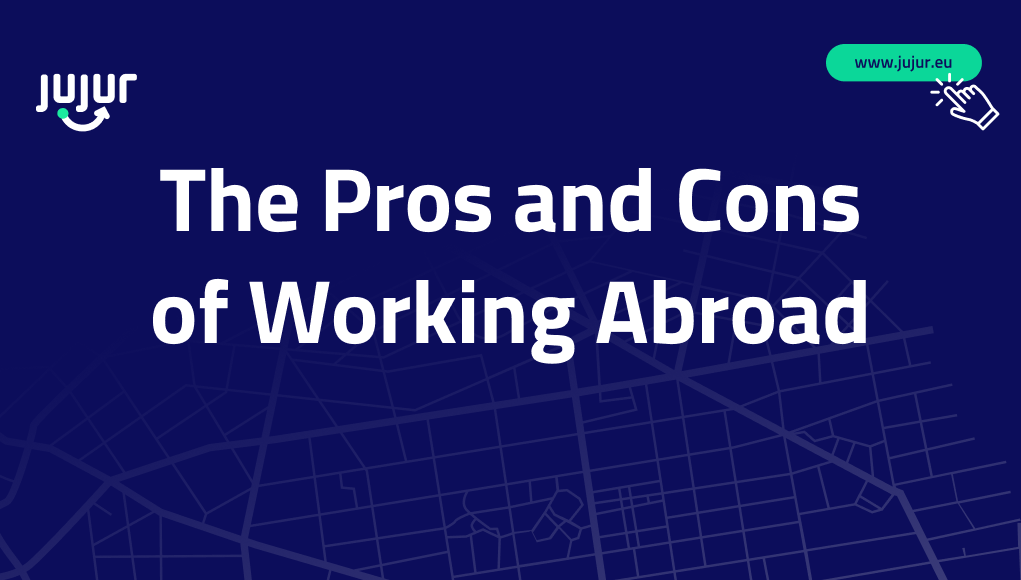Thinking About Moving Abroad for Work? Here’s What to Consider
Packing your bags and starting a new chapter in another country sounds like an adventure, right? The idea of a fresh start, better career prospects, and immersing yourself in a new culture is exciting. But before you picture yourself enjoying coffee in Paris before work or catching a sunset in Bali after office hours, let’s talk about the reality: working abroad comes with incredible opportunities, but also its fair share of challenges.
As recruiters, we’ve seen people thrive in international roles, but we’ve also seen them struggle with unexpected hurdles. Moving for work isn’t just about chasing an adventure; it’s about making an informed decision. So, let’s break it all down: the benefits, the challenges, and everything in between.
The Pros of Working Abroad
Career Growth & Better Job Opportunities
One of the biggest reasons people move abroad for work is career advancement. Some industries offer better opportunities internationally than they do at home, especially if your skills are in high demand. Whether it’s tech, customer support, or back office, moving abroad can fast-track your career, giving you access to higher-paying roles, leadership positions, and invaluable global experience.
On top of that, international experience looks fantastic on a résumé. Employers love candidates who have worked across borders because it shows adaptability, problem-solving skills, and the ability to work in diverse teams. A stint abroad could open up even more doors for you in the future, whether you stay overseas or eventually return home.
Personal Growth & Life Experience
Moving to a new country pushes you outside your comfort zone in ways you never imagined. From figuring out public transport in a foreign language to adjusting to different workplace cultures, every day is a learning experience. You’ll become more independent, adaptable, and resilient, qualities that benefit both your career and personal life.
Beyond professional development, living abroad broadens your perspective on the world. You’ll meet people from different backgrounds, experience new traditions, and gain a deeper understanding of different cultures. It’s a transformative experience that shapes how you view life, work, and relationships.
Check out the top 10 multicultural cities to live and work in!
Learning a New Language (or Perfecting One You Already Know)
Nothing beats language immersion when it comes to learning. When you live and work in a country where another language is spoken, you pick it up much faster than you would in a classroom. Whether it’s ordering food, making friends, or handling work tasks, constant exposure helps you build fluency naturally.
Being bilingual is a major asset in today’s job market. Companies, especially multinationals, value employees who can communicate across borders. Even if your workplace operates in English, knowing the local language helps you build stronger relationships, both professionally and socially.
A Higher Quality of Life (Depending on Where You Go)
Some countries prioritize work-life balance, offering shorter work weeks, longer vacations, and better employee benefits. If you’re coming from a high-stress job culture, relocating could significantly improve your overall well-being. Access to quality healthcare, efficient public transport, and safer neighborhoods can make daily life more enjoyable.
Of course, quality of life depends on where you go. While some destinations offer affordable living with excellent public services, others might be costly. Researching the cost of living, salaries, and work culture in your chosen country is key to making the right move.
Financial Perks & Currency Benefits
Earning in a stronger currency can have a huge impact on your financial future. Some expatriates find that their salaries stretch much further abroad, allowing them to save more while still enjoying a comfortable lifestyle. Others benefit from tax incentives or relocation packages designed to attract skilled professionals.
However, financial perks vary. While some countries offer high salaries, they may also come with high living costs. Before making the move, it’s important to calculate your earnings versus expenses to ensure you’re making a financially sound decision.
Convinced? Learn how to find (and get) a job abroad!
The Cons of Working Abroad
Cultural & Language Barriers
Adapting to a new culture isn’t always easy. Workplace norms, communication styles, and even daily interactions can feel unfamiliar at first. Something as simple as how colleagues greet each other or how meetings are run might be completely different from what you’re used to.
Language barriers can also be frustrating, especially in professional settings. Even if you speak the local language, business jargon or industry-specific terms may take time to learn. Miscommunication can lead to workplace challenges, so patience and effort in improving language skills are essential.
Make this transition easier. Check out the best places where you can speak English abroad!
Homesickness & Social Challenges
No matter how exciting a new country is, being away from family and friends can be tough. Holidays, birthdays, and special occasions may feel lonely when celebrated far from home. Even with video calls, there’s no replacement for in-person connections with loved ones.
Building a social circle abroad takes time. Cultural differences can sometimes make it harder to form close friendships, and it’s common for expats to feel isolated in the beginning. Getting involved in local activities, joining expat groups, and putting yourself out there socially can help make the transition smoother.
Work Visa & Legal Headaches
The process of securing a work visa can be long and complicated. Every country has its own requirements, and some have strict immigration policies that make it difficult for foreigners to work legally. If your employer is sponsoring your visa, it’s crucial to understand the conditions attached to it.
Visa renewals and work permit restrictions can also be a source of stress. Some professionals find themselves needing to switch jobs or even leave the country unexpectedly due to visa issues. Doing thorough research on legal requirements before moving is crucial to avoid unwanted surprises.
Cost of Living & Relocation Expenses
Relocating isn’t cheap. Flights, visa fees, initial housing, and transportation costs can add up quickly. Even if you land a well-paying job, adjusting financially in the first few months can be challenging.
The cost of living varies significantly depending on the city and country. Some high-paying destinations also have expensive rent, food, and daily expenses. It’s important to compare your expected salary with living costs to make sure your new lifestyle is financially sustainable.
Job Security & Economic Stability
As a foreign worker, you may have less job security than local employees, especially during economic downturns. Some governments prioritize hiring citizens over expats, making it harder to maintain long-term employment. Visa regulations and employment laws can also change, impacting job stability.
The overall economic situation of your destination country plays a big role in career prospects. Some industries remain stable regardless of economic conditions, while others may be more vulnerable to market fluctuations. Researching job security and economic trends before moving is essential.
Final Thoughts & Next Steps
Working abroad can be a life-changing experience, offering career growth, financial benefits, and personal development. But it’s not a decision to take lightly. Weigh the pros and cons, do your research, and prepare for the challenges ahead.
Thinking about taking the leap? We help job seekers find international opportunities that match their skills and goals. Reach out to explore your options and start planning your next big move.









